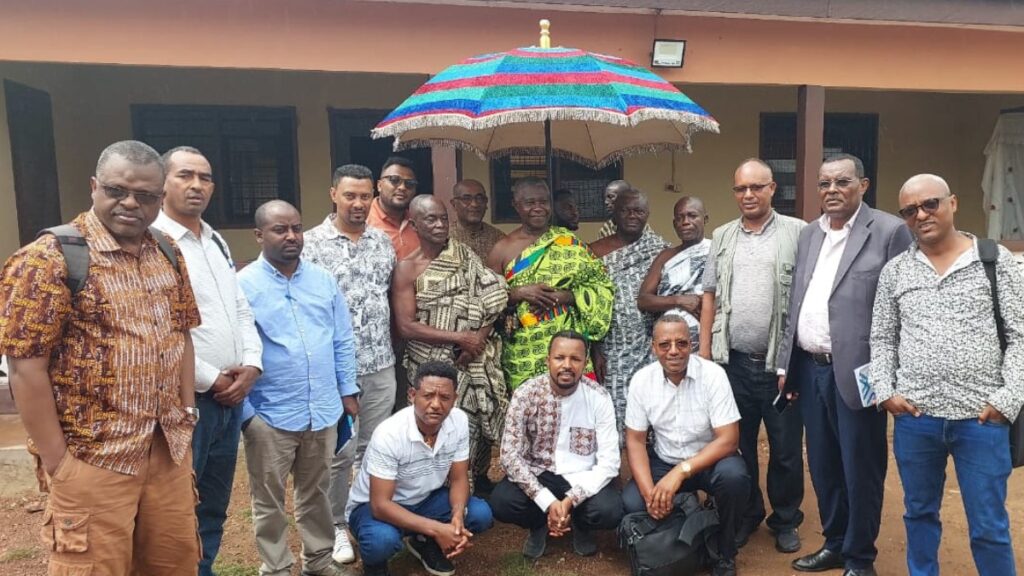Ethiopia and Ghana exchange insights on community scorecard success in experience-sharing mission
Published: 10 September 2024
Leadership is key to the success of any program, and in Ghana, the Ministry of Health and Ghana Health Service leadership has demonstrated a deep understanding of the Community Scorecard and its benefits, which we need to emphasise more in Ethiopia.
remarked Mr Geremew Uga, CEO of the Reform Executive Office at Ethiopia’s Ministry of Health, during a recent experience-sharing mission in Ghana
Mr. Geremew was part of the 12-member delegation from Ethiopia’s Federal Ministry of Health that recently concluded a one-week visit, organised by the African Leaders Malaria Alliance (ALMA) to facilitate the sharing of experiences and best practices in the implementation of the Community Scorecard which is implemented by both countries.
Ghana, which adopted the Community Scorecard (CSC) in 2018 has since overseen its progressive rollout across 15 of the country’s 16 administrative regions. By implementing the CSC, Ghana aims to enhance community participation and feedback on health service delivery, leading to improved health service outcomes and has already recorded significant success with this approach.

Among the notable successes is the emerging greater community contribution to health facility infrastructure, such as donations of furniture and improvements in waste management and facility upkeep. These efforts have eased the administrative burden on the government while ensuring that healthcare services are more responsive to the needs of the community.
These milestones formed the basis of the visit from Ethiopian officials who guided by Ghana’s Ministry of Health, the Ghana Health Service (GHS) leadership, and a National Consultant, visited the Ashanti Regional Health Directorate, specifically the Ejisu Municipality where they observed the implementation of the CSC at regional, district, and community levels and witnessed its impact first-hand. Another remarkable lesson was drawn from Ghana’s integration of the Community Scorecard into the Community-based Health Planning and Services (CHPS) program, along with its use in quarterly, half yearly and annual performance reviews. This approach was highlighted as a key element of health systems strengthening.
These and other impactful practices provided valuable insights for the Ethiopian delegation as they seek to enhance their own implementation of the Community Scorecard. As one of the delegation members noted, the experience was particularly useful in helping the team identify ways to scale up observed successes for stronger implementation and outcomes of the country’s Community Scorecard. Ethiopia, which adopted the scorecard in 2017 as part of its Health Reform Agenda, currently uses it in 55% of its districts to monitor flagship initiatives like the Woreda District Transformation and the Primary Health Care Improvement Programs.
The experience-sharing mission was equally eye-opening for the Ghanaian team as the Ethiopian delegation shed light on some of their own successes, such as increased district-level budget allocations for supplies and heightened community engagement. The latter has been particularly evident through community contributions to initiatives such as the procurement of ambulances and power generators for health facilities.
The exchange of best practices further led to constructive recommendations with the Ethiopian delegation for example suggesting that Ghana consider incorporating direct facility performance scoring by beneficiaries alongside feedback from Community Health Management Committees (CHMC). Additionally, the Ethiopian team extended an invitation to the Ghanaian team to visit Ethiopia to observe the full coverage of the community scorecard implementation in Addis Ababa, where community dynamics differ from rural areas.
“We appreciate the efforts of ALMA in arranging this visit to Ghana to learn how they are using the Community Scorecard in health centers, CHPS, and hospitals in both rural and urban areas. Based on what we have observed, we plan to adapt and scale up our strategy back in Ethiopia. We have been exceptionally well-received and treated throughout our visit, and we are grateful for the practical learning sessions.
Mr Assefa Ayde – a Senior Expert from Ethiopia’s Reform Executive Office
This mutual exchange of knowledge and strategies has fostered a stronger relationship between the two countries’ health departments, setting the stage for continued collaboration and shared progress in improving health service delivery. The African Leaders Malaria Alliance (ALMA) remains committed to supporting sustained cross-learning among African Union member states through such avenues including the Scorecard Hub to enhance the impact of scorecard implementation across the continent.